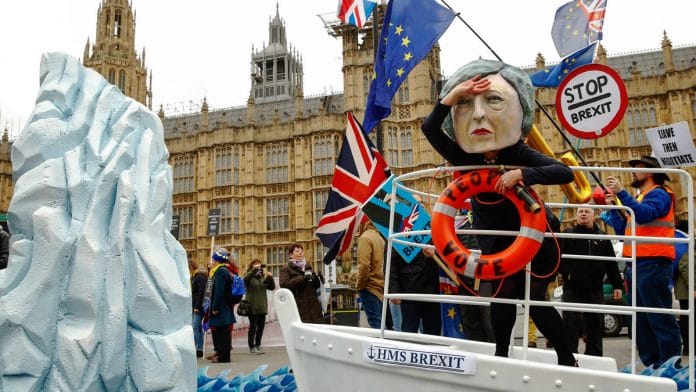New Delhi: On Wednesday, two contentious legislative bills emerged as the key driving factor of politics in the United Kingdom and Hong Kong. While the British Parliament passed a bill to ensure that the UK does not crash out of the European Union without a deal, Hong Kong’s government withdrew the controversial “extradition bill” which had led to three months of protests.
ThePrint takes a look at both the bills and what could be the way forward.
Once cleared by both houses, the bill would compel Prime Minister Boris Johnson to ask the European Union to extend the current Brexit deadline (31 October).
According to Labour Party MP Hilary Benn, who is the bill sponsor, its sole purpose is to “to prevent a no-deal Brexit”.
Johnson had earlier threatened that if the Brexit delay bill is passed, he would call for an immediate snap election. But a snap election right now seems like an unlikely outcome.
Johnson needs a 2/3rd parliamentary majority to facilitate a snap election. He is already running a minority government and it is unlikely that he would succeed in convincing the opposition parties to back a snap election.
Hong Kong extradition bill withdrawn, but protests might still continue
After three months of charged protests, the Hong Kong’s Chief Executive Carrie Lam had announced that the government will withdraw the controversial extradition bill.
Lam had said that the decision to withdraw the bill was not hers, but made by Beijing.
Had it been passed, the extradition bill would have allowed Mainland China to extradite people from Hong Kong – which at present is not a possibility under the legal arrangements between Hong Kong and Beijing.
But the extradition bill led to a wider protest movement in Hong Kong, which saw more than a quarter of the island’s population come out and protest.
Protestors have dismissed the withdrawal of the bill as “too little and too late”. They also argued that only one of their five demands has been met by the government.
According to a report in the CNN, the protestors’ have demanded withdrawal of the bill, “for leader Carrie Lam to step down”, “an inquiry into police brutality”, to release those arrested and “greater democratic freedoms”.
Given the fact that protests have now assumed a much wider scope than just withdrawal of the extradition bill, it is likely that demonstrations would continue over the coming weeks.
Also read: Conservative rebels defeat British PM’s Brexit gamble. What happened in there






